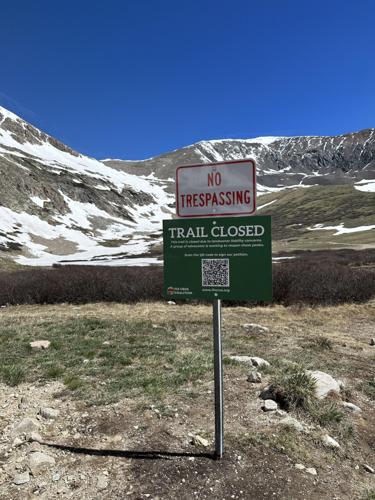Coalition seeks to quell liability concerns that have closed Colorado 14ers
A coalition is growing with the hopes of fixing what many recreation advocates see as a big issue facing Colorado’s outdoors.
The coalition is called Fix CRUS, in reference to the Colorado Recreational Use Statute. That’s the long-standing provision that some legislators, advocates and landowners attempted to amend earlier this year in hopes of easing those landowners’ liability concerns over hikers on their properties.
Senate Bill 103 failed to pass through the Senate Judiciary Committee in March. That resulted in the indefinite closure of mining claims along mounts Lincoln, Democrat and Bross — effectively making the 14,000-foot loop known as Decalibron off-limits. No trespassing signs have also been posted at the base of another fourteener, Mount Lindsey.
At the Kite Lake trailhead, the popular launch point for Decalibron, Fix CRUS recently installed a sign alerting visitors to the closure and the effort to restore access. The sign includes a link to the group’s petition to several senators and the governor; at the end of June, the petition was nearing its goal of 2,500 signatures.
The goal this summer is “education and outreach,” said Alex Derr, secretary for Fix CRUS. “Letting people know that, yes, these (peaks) are closed, but they don’t have to be.”
The organization’s chair, Anneliese Steel, has also expressed worry for the future of beloved climbing routes around the Front Range. She represents the nonprofit Boulder Climbing Community and has noted “a significant amount” of popular routes on privately-owned crags, including around Boulder and Clear Creek canyons.
The change seen as needed for the Colorado Recreational Use Statute “may sound like a small change,” Steel wrote in a letter posted on fixcrus.org, “but it has big consequences for public access to private land.”
The issue sprung from a 2019 case in which a judge awarded a mountain biker $7 million for injuries sustained on a washed-out trail at the Air Force Academy. The failure to repair the trail was determined to be a “willful or malicious failure to guard or warn against a known dangerous condition,” as the recreational use statute requires.
As Kari Jones Dulin with the Colorado Trial Lawyers Association said in opposing Senate Bill 103: “All that it asks of a landowner is, if you know something is dangerous and likely to cause harm, either guard against it or warn against it, which is to say: If you know something, do something. … Isn’t that just basic human decency?”
Fix CRUS sees “willful or malicious” as “too broad,” Derr said, explaining that a “willful failure” could perhaps apply to landowners aware of inherent dangers in the outdoors. It could be costly and time-consuming to “guard or warn” against them, Derr noted.
“We’re looking to change it to just ‘malicious failure,'” he said, to be read perhaps another way: “If you go hiking on a fourteener, you assume the risks unless there’s something malicious going on.”
Specifics are to be discussed this summer, he said, adding that Fix CRUS only recently scheduled its first full meeting. The coalition consists of about two dozen organizations, including recreation and conservation groups, municipalities and the Colorado Farm Bureau.
It’s a chance to build a deeper relationship with owners of lands and waters around the state, Derr said.
“I think a bigger piece being left out of the conversation is if we could open up a lot more private land,” he said. “My hope is that a year from now after we’ve gone through the trials and tribulations of a policy change campaign, we can all then go out and work together and say, Hey, things have changed, the state is going to bat for you.”





